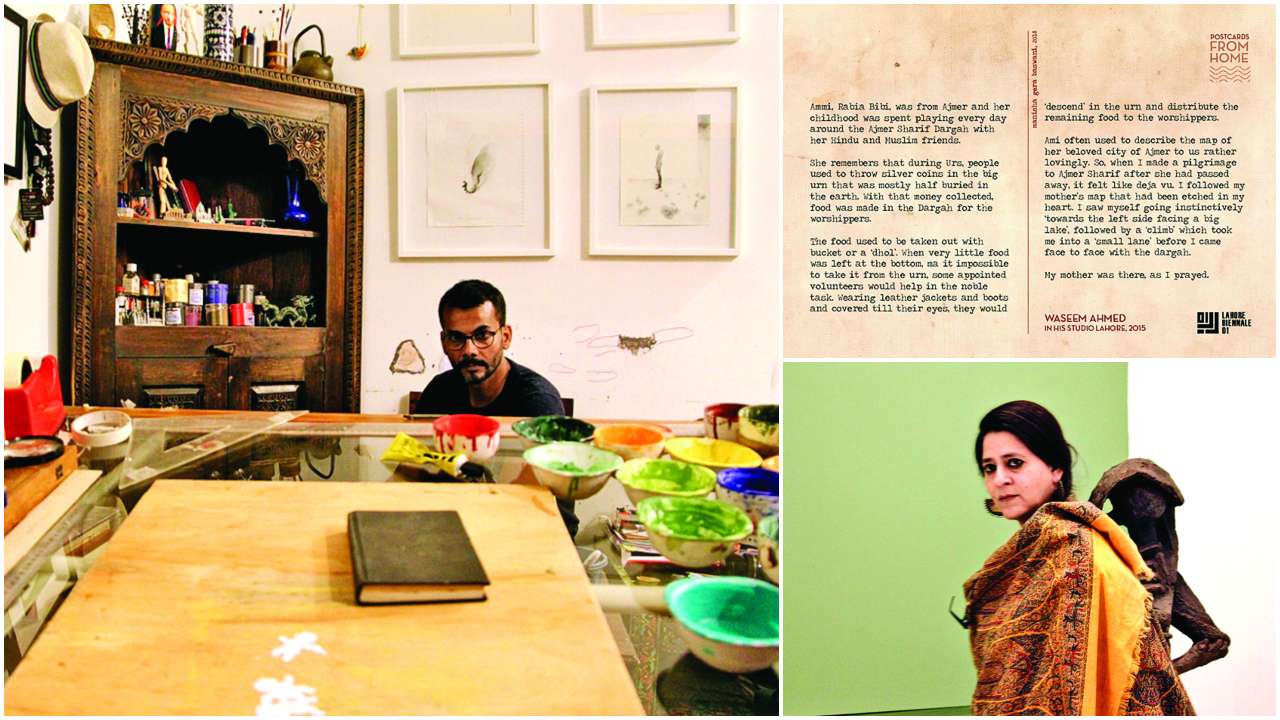
Manisha Gera Baswani's 'Postcards from Home', which created quite a buzz when it showed at the Lahore Biennale in March this year, will finally be seen in India. The art project, involving 47 artists from India and Pakistan with roots on the other side of the border, has been invited to take part of the Kochi Muziris Biennale as a collateral event.
'Postcards from Home' grew out of Artist Through the Lens, a project that Gera-Baswani has been working on for many years now of making candid photographs of Indian artists, collectors, curators, etc. In 2015, when Gera-Baswani, who is essentially a painter, went to Karachi for a show, she decided to extend her ambit to Pakistani artists. When she spoke to them, several spoke poignantly of India, where they or their families had homes before Partition. Back in India, she got in touch with Indian artists who came from or had family across the border, and their testimonies revealed similar sentiments. Gera-Baswani was familiar with these sentiments – her parents, too, had come to India before Partition, and spoke fondly of 'Fort Sandeman' and childhood pursuits like trapping and training falcons.
'Postcards... grew out of these sentiments. On one side of these postcards are images of the artists, and on the other a brief text, "a memory, that tugs at the heart of the artist directly or through stories narrated by his/her parents or grandparents of pre-Partition India".
This they do, some directly, and some obliquely. There's for instance, Rashmi Kaleka, whose mama (uncle) went back to Lahore in the middle of the 1947 violence to bring back his door, which was later fitted to the house he built in Delhi. And Ranbir Kaleka, who recounts a whimsical story of looking down from the terrace of his ancestral haveli as a four-year-old at a 'colourful garden' – flowers? Or buffaloes, cow, oxen and a lone horse draped in the florid ghagras left behind by Muslim families who'd taken refuge in the haveli at the time of Partition because they were too heavy and unwieldy, and were now used to warm the animals in winter?
For those few remaining of the generation who lived through those tumultuous months, the memories are more personal. For Krishen Khanna, 93, Pakistan, where he was born, is tied up with memories of his wife Renu, while Paramjit Singh, who was 12 at the time of Partition, remembers most vividly the eye doctor in Lahore who first said he needed spectacles and 'Hajiji's optical shop' from where he got his first ainak.
Memories of childhood die hard. Across the border, Ahmed Khan, a senior artist from Karachi, spent the early part of his life in Shahjahanpur still remembers the poori-halwa his friend Nand Kishore's mother made specially for him, the Sikh gentleman who picked him up when he hurt himself as a child and his Hindu landlord's brother who took him to the hospital. "I was an injured child; that was all the consideration that was needed in those days."
Memories can be painful too. Salima Hashmi, a senior artist and the daughter of poet Faiz Ahmed Faiz, recounts pushing her baby sister's pram down the slope of the little bridge in Lodhi Gardens in Delhi, the city she was born in, "in a fit of sibling jealousy". It's only when, many years later, that she was able to bring her own children to the same spot that her "fear and remorse" over doing so finally left her.
Memories, and feelings are universal, and respect no borders. But it's easy to forget this amidst the din of competitive nationalism and rancor that marks India-Pakistan relations. Maybe we need more such projects, and for them to be seen more, to realise our common humanity.